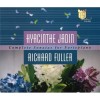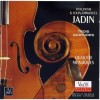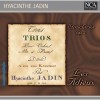Composers
Hyacinthe Jadin (April 27, 1776, Versailles – September 27, 1800, Paris) was a French composer who came from a distinguished musical family. His uncle Georges Jadin was a composer in Versailles and Paris, along with his father Jean Jadin, who had also played bassoon for the French Royal Orchestra. He was one of five musically gifted brothers, the most famous of which was Louis-Emmanuel Jadin.
Jadin was a pupil of Nicolas Joseph Hüllmandel, who belonged to the famous École des Pianistes Parisiens (School of Pianists in Paris). Hüllmandel himself was a student of C.P.E. Bach, and was an excellent teacher who brought out Jadin's pianistic brilliance. At the age of 9, Jadin’s first composition, a Rondo for piano, was published in the Journal de Clavecin. By the age of thirteen, Jadin had premiered his first work with the Concert Spirituel.
The times in which Jadin lived dictated to a large degree his chance at musical greatness. In 1789, the same year of his public performance premiere, the French Revolution broke out. The Revolution provided some work for Jadin, as the demand for theatre and music that reflected the values of the Revolution increased.
He took a job in 1792 as assistant rehearsal pianist (Rezizativbegleiter) at the Theatre Feydeau. In this year he composed the Marche du siège de Lille ("March of the Siege of Lille"), commemorating the successful resistance of the citizens of Lille when besieged by Austrian forces, a highly publicised event at the time.
In 1794, after Robespierre’s Great Terror claimed the life of Jean-Frédéric Edelmann, another member of the École des Pianistes Parisiens, Hüllmandel fled France, leaving Jadin behind. In the same year, Jadin published an overture for 13 wind instruments entitled Hymn to the 21st of January. The piece commemorated the one-year anniversary of the execution of Citizen Capet (the name given to Louis XVI during his trial for treason). In 1795, he began teaching a female piano class at the Paris Conservatoire.
From 1795 to 1800, Jadin was plagued by tuberculosis. His sickness was serious enough that Napoleon Bonaparte himself excused Jadin from military service. Similar to how the French Revolution presented an inevitable obstacle to Jadin’s musical greatness, the state of medicine in the late 18th century prevented him from living long enough to have as profound an impact on music as he otherwise could have. Tuberculosis at this time was almost a certain death sentence, and he gave his last public concert on September 22, 1799, before dying the following year. At the time of his death, he was impoverished – still owed several months’ salary by the Paris conservatory – another consequence of the constant political unrest that marked the place and time in which he lived.
Recently Added
| Country: | France |
| Period: | Classique, Romantique |
Biography
Hyacinthe Jadin (April 27, 1776, Versailles – September 27, 1800, Paris) was a French composer who came from a distinguished musical family. His uncle Georges Jadin was a composer in Versailles and Paris, along with his father Jean Jadin, who had also played bassoon for the French Royal Orchestra. He was one of five musically gifted brothers, the most famous of which was Louis-Emmanuel Jadin.
Jadin was a pupil of Nicolas Joseph Hüllmandel, who belonged to the famous École des Pianistes Parisiens (School of Pianists in Paris). Hüllmandel himself was a student of C.P.E. Bach, and was an excellent teacher who brought out Jadin's pianistic brilliance. At the age of 9, Jadin’s first composition, a Rondo for piano, was published in the Journal de Clavecin. By the age of thirteen, Jadin had premiered his first work with the Concert Spirituel.
The times in which Jadin lived dictated to a large degree his chance at musical greatness. In 1789, the same year of his public performance premiere, the French Revolution broke out. The Revolution provided some work for Jadin, as the demand for theatre and music that reflected the values of the Revolution increased.
He took a job in 1792 as assistant rehearsal pianist (Rezizativbegleiter) at the Theatre Feydeau. In this year he composed the Marche du siège de Lille ("March of the Siege of Lille"), commemorating the successful resistance of the citizens of Lille when besieged by Austrian forces, a highly publicised event at the time.
In 1794, after Robespierre’s Great Terror claimed the life of Jean-Frédéric Edelmann, another member of the École des Pianistes Parisiens, Hüllmandel fled France, leaving Jadin behind. In the same year, Jadin published an overture for 13 wind instruments entitled Hymn to the 21st of January. The piece commemorated the one-year anniversary of the execution of Citizen Capet (the name given to Louis XVI during his trial for treason). In 1795, he began teaching a female piano class at the Paris Conservatoire.
From 1795 to 1800, Jadin was plagued by tuberculosis. His sickness was serious enough that Napoleon Bonaparte himself excused Jadin from military service. Similar to how the French Revolution presented an inevitable obstacle to Jadin’s musical greatness, the state of medicine in the late 18th century prevented him from living long enough to have as profound an impact on music as he otherwise could have. Tuberculosis at this time was almost a certain death sentence, and he gave his last public concert on September 22, 1799, before dying the following year. At the time of his death, he was impoverished – still owed several months’ salary by the Paris conservatory – another consequence of the constant political unrest that marked the place and time in which he lived.





